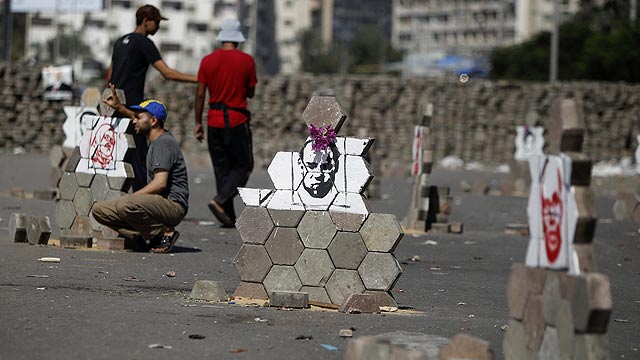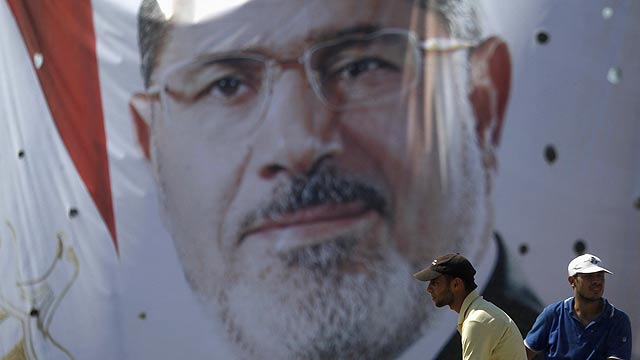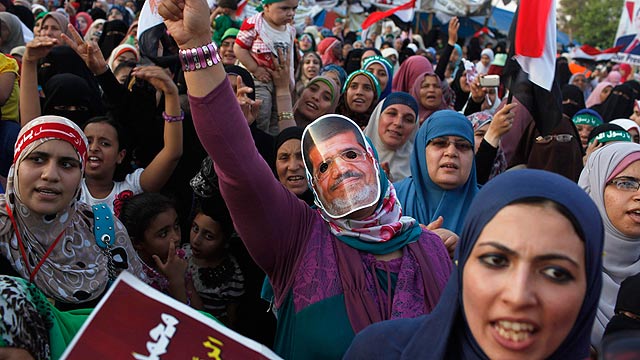Egyptian security forces will besiege two sit-ins by supporters of the country's ousted president within 24 hours, police officials said Sunday, setting up a possible confrontation between the military-backed government and the thousands gathered there.
One police official suggested action against the sit-in protests by supporters of ousted President Mohamed Morsi could begin as early as daybreak Monday.
Related stories:
- Wife of Egypt's ousted leader makes 1st appearance
- Morsi backers defy Egyptian police
- US senators' reconciliation message fails to move Egyptians
Officials, who spoke anonymously in line with regulations, told The Associated Press they are also preparing for possible clashes that might erupt in reaction to the cordons they will set up barring anyone from entering.
Monuments to Morsi supporters killed by army (Photo: Reuters)
Morsi's supporters have said they will not leave the sit-ins until the president, ousted in a popularly supported coup July 3, is reinstated.
Efforts by the international community to end the standoff and find a peaceful resolution to the crisis failed. Egypt's prime minister warned just ahead of the Muslim Eid al-Fitr holiday that ends Sunday that the government's decision to clear the sit-ins was "irreversible."
Egypt's new leadership says that the sit-ins and protests have frightened residents of Cairo, sparked deadly violence and disrupted traffic in the capital. Leaders of the sit-in say their protests have been peaceful and blame security forces and "thugs" for violence.
Protesters in Rabaa Al-Adawiya Mosque (Photo: Reuters)
Morsi supporters in Cairo (Photo: Reuters)
The Arab world's most populous country is readying itself for more potential bloodshed. Already more than 250 people have been killed in violence since Morsi's ouster.
A last-ditch effort over the weekend by the Sunni Muslim world's pre-eminent religious institution, Al-Azhar, also failed to push the two sides closer to reconciliation. Mass rallies two weeks ago called by military leader Gen. Abdel-Fattah al-Sissi showed that a large segment of Egypt's population backs action by the armed forces.
The Interior Ministry had said earlier it would not clamp down on the protesters but will take gradual measures, which include the cordons. Other measures suggested include the use of water cannons and tear gas to minimize casualties.
The protesters, expecting an imminent security push to clear them out, have begun fortifying their positions.
At Egypt's main protest camp in eastern Cairo, vendors say they have sold hundreds of gas masks, goggles and gloves to protesters readying themselves for police tear gas. A few meters (yards) away from the vendors, three waist-high cement and wooden barriers have been constructed by protesters to keep armored vehicles from crushing the sit-in.
The protests include many women and children. Organizations like UNICEF have cautioned against what they say is the deliberate use of children in Egypt who are "put at risk as potential witnesses to or victims of violence." Morsi's Muslim Brotherhood group says it cannot control whether families choose to stay camped out.
Some of the Islamist group's top leaders have used the sit-ins as a cover to avoid arrest. Others have already been detained and face charges of inciting violence. Morsi has been held at undisclosed locations since his ouster and is facing a criminal investigation.
Tensions between Muslims and Christians south of Cairo have been especially high since the Islamist president's ouster. On Sunday, 15 people were wounded when a Muslim woman tried to stop a Christian neighbor from building a speed bump in front of her home. Officials say both families started fighting and assailants tossed gasoline bombs into four Christian homes and a local church.
- Receive Ynetnews updates
directly to your desktop


















